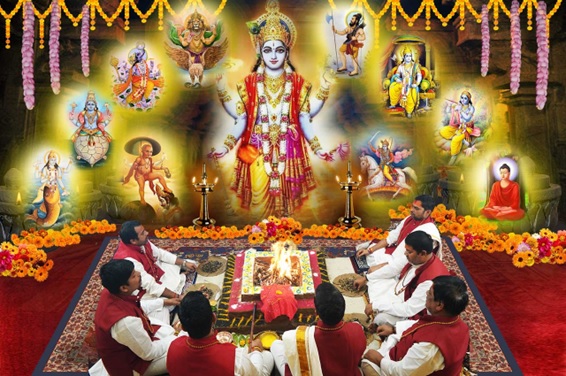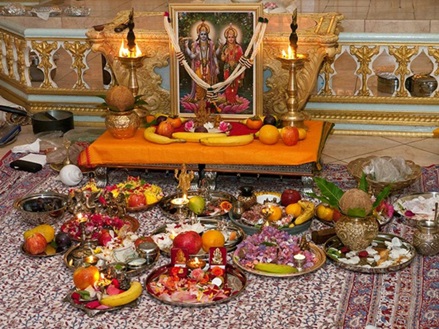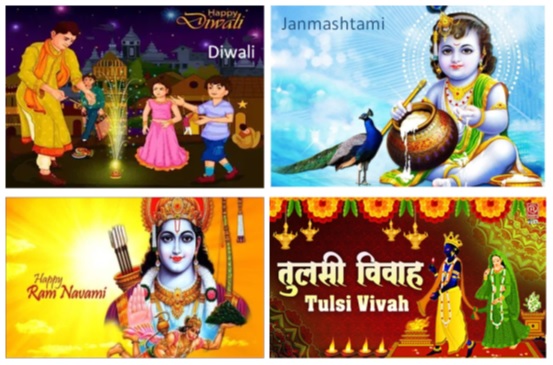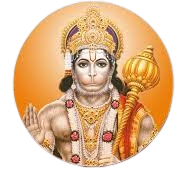Lord Vishnu
भगवान विष्णु
Lord Vishnu - Facts , Significance , Prayers , Avatars
Lord Vishnu is one of the principal deities and revered gods in Hinduism (Santana Dharma). He is considered the preserver and protector of the universe. Lord Vishnu is part of the holy divine Hindu trinity, along with Lord Brahma (the creator) and Lord Shiva (the destroyer).
The Bharma, Vishnu, and Mahesh together form a triad responsible for the wellbeing of the universe. Vishnu is the supreme godhead of Vaishnavism (Para Brahman or Nirguna Brahman) in puranas. He is called Swambhagwan in the Ramayana and Mahabharata.
He is also known as Narayana and Hari, is one of the principal deities of Hinduism. He is the supreme being within Vaishnavism, one of the major traditions within contemporary Hinduism.
Lord Vishnu’s role is to maintain cosmic order and harmony by incarnating on Earth whenever there is a decline in righteousness and an increase in unrighteousness. Vishnu’s role is to maintain cosmic order (dharma) and protect the world whenever it is threatened by evil forces.
The Vishnu Purana is among the shorter Purana texts, with about 7,000 verses in extant versions. It primarily centres around the Hindu god Vishnu and his avatars, such as Krishna, but it also praises Brahma and Shiva and asserts that they are dependent on Vishnu.
Lord Vishnu - Birth And Origin
- Lord Vishnu is often described as eternal and formless, residing in the highest spiritual realm called Vaikuntha. He is believed to be self-existent and without a beginning or end.
- Vishnu is commonly depicted with a blue complexion, holding a conch shell (shankha), a discus (chakra), a mace (gada), and a lotus (padma) in his four hands, symbolizing various aspects of his power and authority.
Lord Vishnu - Birth And Origin
- Lord Vishnu is often described as eternal and formless, residing in the highest spiritual realm called Vaikuntha. He is believed to be self-existent and without a beginning or end.
- Vishnu is commonly depicted with a blue complexion, holding a conch shell (shankha), a discus (chakra), a mace (gada), and a lotus (padma) in his four hands, symbolizing various aspects of his power and authority.
Lord Vishnu - Significance And Roles
- Preserver of the Universe: Lord Vishnu’s primary role is to preserve and protect the universe (dharma). Whenever there is a threat to the cosmic order and righteousness is endangered, he incarnates on Earth in various forms (avatars) to restore balance and destroy evil forces.
- Avataras: Vishnu is believed to have incarnated in ten major forms, known as the Dashavatara, which includes avatars like Lord Rama and Lord Krishna. His avatars are revered for their teachings, valor, and divine qualities.
- Lakshmi and Narayana: Vishnu is often depicted with his consort, Goddess Lakshmi, symbolizing prosperity, wealth, and abundance. Together, they represent the divine couple.
- Cosmic Functions: Vishnu is responsible for the sustenance and maintenance of the universe. His divine sleep on the cosmic ocean is believed to create a state of equilibrium in the universe.
- Vishnu Sahasranama: The Vishnu Sahasranama is a sacred text consisting of a thousand names of Lord Vishnu, highlighting his various attributes, qualities, and forms. It is a revered scripture for Vishnu devotees.
Lord Vishnu Incarnations - Vishnu's Divine Avatars
One of the distinctive features of Lord Vishnu is his ability to incarnate on Earth in various forms, known as avatars, to protect dharma and restore cosmic balance. The ten principal avatars of Vishnu are collectively known as the Dashavatara.
Each avatar is a manifestation of divine intervention in response to particular challenges faced by humanity. Some of the most revered Vishnu avatars include: Lord Krishna – Krishnaavatar , Lord Rama – Ramaavatar
- Matsya (The Fish): Vishnu assumed the form of a fish to save humanity and the sacred scriptures during a great flood, symbolizing preservation and rescue.
- Kurma (The Tortoise): In the form of a tortoise, Vishnu acted as the pivot during the churning of the cosmic ocean, symbolizing stability and support.
- Varaha (The Boar): Vishnu incarnated as a boar to rescue the Earth, which had sunk into the cosmic ocean, and restore it to its rightful place, symbolizing protection and strength.
- Narasimha (The Man-Lion): Vishnu manifested as a half-man, half-lion to defeat the demon king Hiranyakashipu, who could not be killed by man or beast, symbolizing divine justice and courage.
- Vamana (The Dwarf): As a dwarf Brahmin, Vishnu outwitted the demon king Bali, who sought to conquer the cosmos. Vishnu’s form grew to immense proportions, symbolizing humility and balance.
- Parashurama (The Warrior with an Axe): Vishnu took the form of a warrior to rid the world of corrupt and oppressive rulers, symbolizing valor and the restoration of justice.
- Rama (The Prince of Ayodhya): Lord Rama, the hero of the epic Ramayana, exemplified ideal kingship, righteousness, and devotion. His story highlights the importance of duty and dharma.
- Krishna (The Divine Cowherd): Lord Krishna, the central figure of the Mahabharata and the Bhagavad Gita, taught profound spiritual and ethical lessons, emphasizing the path of devotion and selfless action.
- Buddha (The Enlightened One): Some traditions recognize Lord Buddha as an avatar of Vishnu. His teachings of compassion and the Middle Way had a profound impact on spirituality.
- Kalki (The Future Warrior): Kalki is prophesized to appear in the future to restore righteousness at the end of the current cosmic cycle, symbolizing hope and renewal.
Lord Vishnu Worship Practices
Lord Vishnu, one of the principal deities in Hinduism, is widely worshiped and celebrated through various festivals and rituals. These worship practices are specific to various Vishnu Avatars.
These festivals and worship practices provide opportunities for devotees to express their devotion to Lord Vishnu and seek his divine blessings.
Some of the most important worship (Bhakti / Puja) practices and festivals associated with Lord Vishnu:

- Vishnu Puja:
- Daily Worship: Many devotees offer daily prayers and offerings to Lord Vishnu in their homes or at temples. The worship often includes chanting of Vishnu Sahasranama (the thousand names of Vishnu) and offerings of flowers, incense, and food.
- Vaishnavism:
- Vaishnavism is a sect within Hinduism dedicated to Lord Vishnu and emphasizes the worship of Vishnu in various forms, including Rama and Krishna. Devotees follow specific rituals and customs associated with Vaishnavism.
- Ekadashi Fasting:
- Ekadashi is observed on the 11th day of both the waxing and waning phases of the moon. Devotees fast on this day and engage in spiritual activities to seek Lord Vishnu’s blessings.
- Prayers and Mantras:
- Devotees often recite specific mantras and prayers dedicated to Lord Vishnu, such as the Vishnu Sahasranama, the Narayana Kavacham, and the Vishnu Stotram.
- Vishnu Temples:
- Temples dedicated to Lord Vishnu are found across India and other parts of the world. The temples serve as important places of worship, and devotees visit to offer their prayers and seek blessings.
विष्णु पूजा
Lord Vishnu Puja
Puja (worship) of Lord Vishnu is a significant aspect of Hindu devotion, and it can be performed in various ways, depending on personal preference and tradition. Here’s a general guideline for performing Lord Vishnu Puja:
Before You Begin Puja
- Purification: Begin by purifying yourself by taking a bath and wearing clean clothes. This signifies physical and mental purity.
- Choose a Quiet Place: Select a clean and quiet spot for your puja. It can be in your home or at a temple.
- Altar Setup: If you have a home altar, place an image or idol of Lord Vishnu on it, or you can use a picture of Lord Vishnu. Light an oil lamp or a ghee lamp, and have incense, flowers, water, and some sweets (prasad) ready for offering.
Steps For Vishnu Puja (Worship)
It’s important to perform puja with devotion, sincerity, and a pure heart. While the steps provide a general outline, you can customize your worship according to your tradition and preferences.
Additionally, you can consult with a priest or spiritual guide for specific rituals and mantras if you follow a particular tradition.

- Ganesh Puja: Begin by offering prayers to Lord Ganesha, the remover of obstacles. Chant the Ganesh mantra and offer flowers, incense, and prasad.
- Invoking Lord Vishnu: Chant the Vishnu Sahasranama (thousand names of Vishnu) or any other Vishnu mantra. This is followed by the act of inviting Lord Vishnu to be present during the puja.
- Light the Lamp: Light the lamp and incense. The flame of the lamp symbolizes the divine light and the incense purifies the environment.
- Offering Water (Arghya): Offer water to Lord Vishnu, preferably with a conch shell. Pour a few drops of water while ringing a bell and recite Vishnu’s name or mantras.
- Offering Flowers: Offer fresh flowers to the deity while chanting Vishnu mantras or stotrams (hymns dedicated to Lord Vishnu).
- Food Offering (Naivedya): Offer your prepared food (prasad) to Lord Vishnu. Traditional offerings include fruits, sweets, and other vegetarian dishes. While offering, chant Vishnu mantras.
- Aarti: Perform the aarti by circling the lamp in a clockwise motion in front of the deity while singing or reciting aarti songs dedicated to Lord Vishnu.
- Deep Pradakshina: Light a camphor or ghee lamp and do a deep pradakshina, which means walking around the deity with the lit lamp.
- Silent Meditation: Sit quietly and meditate on Lord Vishnu, seeking his blessings, guidance, and protection. You can also recite Vishnu mantras during this time.
- Prayer and Request: Offer your prayers, make requests, and express your devotion to Lord Vishnu.
- Distributing Prasad: After the puja, distribute the prasad to family members and guests.
Lord Vishnu Festivals
Festivals dedicated to Lord Vishnu are celebrated with great devotion and enthusiasm by his followers. These festivals offer an opportunity for devotees to express their reverence and seek the blessings of Lord Vishnu and his various avatars. Here are some of the most prominent Vishnu festivals along with details about their significance and celebrations:

Vaikuntha Ekadashi:
- Celebrated in December-January, Vaikuntha Ekadashi is dedicated to Lord Vishnu in his form as Lord Krishna. Devotees fast and visit Vishnu temples to seek his blessings.
- Rama Navami:
- Rama Navami, celebrated in March or April, marks the birth of Lord Rama, one of the avatars of Lord Vishnu. Devotees read the Ramayana, offer prayers, and participate in processions.
- Janmashtami:
- Janmashtami, celebrated in August, marks the birth of Lord Krishna, another incarnation of Lord Vishnu. Devotees fast, sing devotional songs, and reenact events from Krishna’s life.
- Vishnu Jayanti:
- Vishnu Jayanti is observed on the day of Ekadashi in the month of Kartik (October-November) to celebrate the birth of Lord Vishnu. Devotees perform special prayers and rituals.
- Diwali:
- Diwali, also known as Deepavali, is a festival that includes the worship of Lord Vishnu. It celebrates the victory of light over darkness and is an occasion for joy and festivity.
- Kartik Purnima:
- Kartik Purnima, celebrated in the month of Kartik (October-November), involves lighting lamps and offering prayers to Lord Vishnu. Devotees take holy baths in rivers and lakes.
- Tulsi Vivah:
- This festival is celebrated in November and marks the ceremonial marriage of the sacred basil plant (Tulsi) to Lord Vishnu.
- Holi:
- Holi, the Festival of Colors, is associated with Lord Krishna, who is considered an avatar of Lord Vishnu. Devotees celebrate by playing with colored powders and engaging in festivities.
